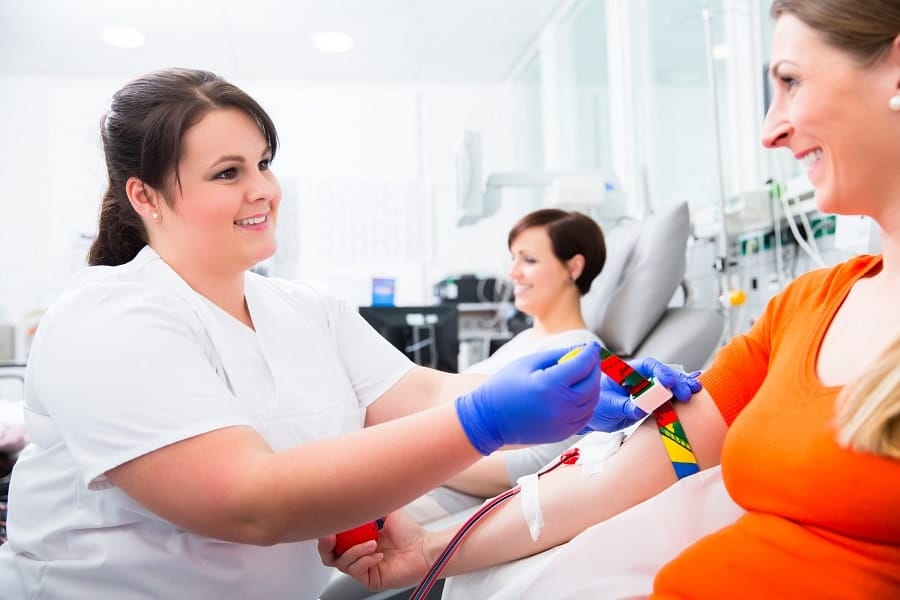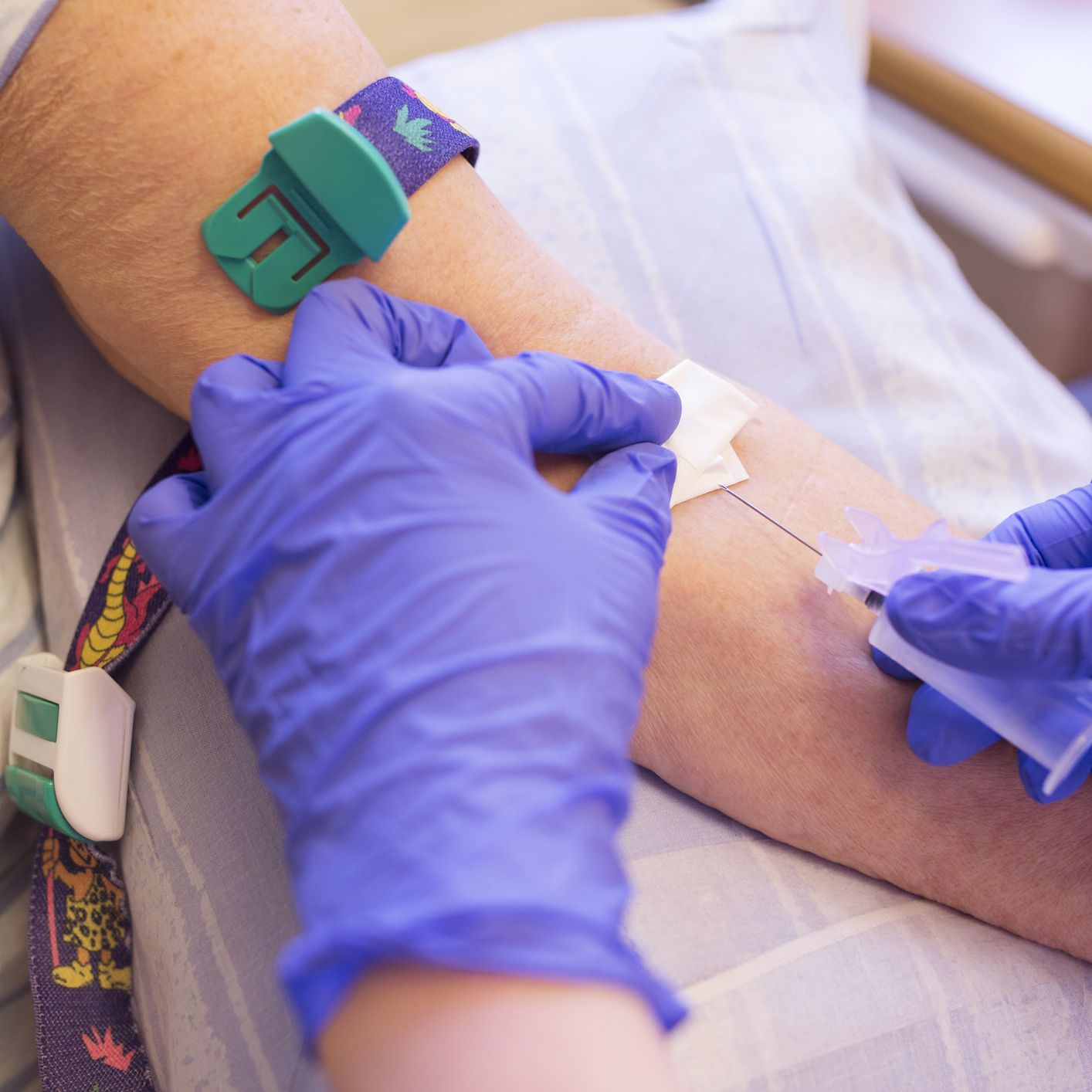Other Requirements To Donate
Again, herpes simplex is transmitted through direct physical contact, and not through blood transfer. So yes, you can still donate blood if you have herpes. For recurring outbreaks, consider waiting until the sores have dried up and healed. As long as you are feeling healthy and meet all other requirements, youre good to go.
Do you want to help others with HSV? If this article was useful, please consider sharing or posting it where it can help someone else.
Herpesyl is a 100% natural blend that targets and eliminates herpes virus in the body.
How And Where To Donate
The need for blood donation is critical and ongoing. From the time of donation, blood can be stored in a refrigerator for only 42 days. Moreover, blood centers typically run out of types O and B, placing patients with these blood types at risk during public health emergencies.
If you are least 16 years of age in most states, are in good health, and weigh at least 110 pounds, you are eligible to be considered as a blood donor. You can find where to donate blood near you by accessing the American Red Cross website.
From start to finish, the blood donation process takes around the hour, including 10 minutes to draw one pint of blood.
Restrictions For Donating Blood If You Have An Std
There are varying timelines for when you can or cannot donate blood with STDs. When in doubt, reach out to your local blood bank and ask for their specific guidelines. You should not donate blood if you suspect you may have human immunodeficiency virus , acquired immunodeficiency syndrome , human T-lymphotropic virus , or hepatitis.
You can never donate blood if you:
- Are HIV positive or receiving HIV treatment
- Are HTLV positiveâ
- Are a carrier of Hepatitis B or C
The American Red Cross says you should not donate if you have done any of the following in the past three months:
- Were a sex worker
- Are a man and had sex with another man
- Had sexual contact with anyone who meets the above-listed criteria
- Injected recreational drugs
- Had a sex partner who is HIV or HTLV positive, a carrier of hepatitis B or C, or a partner who has injected drugs not prescribed by a doctorâ
- Took Pre-Exposure Prophylaxis or Truvada for preventing HIV
If you contracted syphilis or gonorrhea, wait three months following completion of your treatment to donate blood. If you have chlamydia, HPV, or genital herpes, you can still donate blood if you meet the other eligibility requirements.
You May Like: Can You Get Rid Of Herpes Forever
Can I Donate If I Feel Ill Or Have A Cold Sore
If you are feeling under the weather, please wait until you feel better before you give blood.
It is important you do not have any infection at the time of donating.
You must be healed and recovered from any infection for at least 14 days before you give blood.
Use our health & eligibility section to find out more.
Can I Donate Blood

Donating blood is easy and our blood supply relies exclusively on the generosity of volunteer blood donors. There is no substitute for human blood. Most people qualify as a volunteer donor, even if they are taking medications. Review the eligibility criteria below and see if you can be a lifesaver too.
For information about blood donation and the Covid-19 vaccine, visit the Covid-19 and Blood Donation FAQ.
Age Matters
You may donate if you are at least 17 years old , weigh at least 110 pounds, and be in good health.
- Donors age 16-18 are also subject to additional height/weight restrictions.
- Donors age 76 and older can continue to donate blood if they meet all eligibility criteria and present a physician’s letter allowing them to donate, once at the first donation after reaching their 76th birthday. In the absence of a letter from their physician, they must be cleared by an NYBC medical director at each donation.
16 Year Old Parental/Guardian’s Permission Form
New York
7 days after taking See full list of medications that may affect your eligibility as a blood donor.
* These anti-platelet agents affect platelet function so people taking these drugs should not donate platelets for the indicated time however, you make a whole blood donation. Anyone taking Coumadin must wait 7 days after their last dose in order to be eligible for any type of donation.
Permanent Reasons
Please do not give blood if you:
Please Note:
Read Also: Is Hpv And Herpes The Same Thing
What Aresigns You Need Std Testing
If you notice any strange discharge or odors from your genitals or unusual growths or sensations around your genitals, get a Rapid STD Testing10 panel STD test. The test can check for most of the STDs that disqualify people from being blood donors.
Besides STDs, you may not be eligible to donate blood if you test positive for:
- West Nile Virus
- Cytomegalovirus
Can I Donate Blood While On Valtrex
The current American Red Cross guidelines do not list Valtrex as a reason not to donate blood. A 2008 Chicago Tribune article said a person should wait 48 hours after taking antiviral medications to donate, but this is no longer reflected in the Red Cross guidelines. Antivirals include valacyclovir, acyclovir, or famciclovir.
Stress contributes to outbreak frequency. If youre feeling unusually stressed already, any additional stress on your body could have the potential to trigger a herpes outbreak.
Don’t Miss: What Are The Chances Of Spreading Herpes While On Medication
Is It Safe For Me To Donate Blood
If you have diabetes and want to donate blood, its generally safe to do so. People with type 1 and type 2 diabetes are eligible to give blood donations. But you should properly manage your diabetes and be in otherwise good health before donating blood.
Properly managing your diabetes means that you maintain healthy blood sugar levels. This requires you to be vigilant about your diabetes daily. You need to be aware of your blood sugar levels throughout each day and make sure you eat a nutritious diet and exercise sufficiently.
Living a healthy lifestyle will contribute to keeping your blood sugar levels in a healthy range. Your doctor may also prescribe certain medications to help manage your diabetes. These medications shouldnt impact your ability to donate blood.
If you want to donate blood but are concerned about your diabetes, talk with your doctor before your donation. They can answer any questions you may have and help you determine whether this is the best option for you.
How To Donate Plasma If You Have Herpes With Donotpay
DoNotPay is a virtual lawyer chatbot powered by Artificial Intelligence and helps users to solve several legal disputes. The chatbot has an intuitive and user-friendly interface. It can help you with donating plasma if you have herpes.
You simply need to answer a few simple questions so that it guides you on eligibility and connects you with plasma donation centers that pique your interest based on your condition.
Here’s how you can use DoNotPay to become a plasma donor:
Also Check: What Can You Use For Herpes Outbreak
How Test Accuracy Is Measure
The accuracy of all medical tests, including herpes tests, is measured based on two values: sensitivity and specificity.
Sensitivityis how often a test correctly identifies someone with a disease. A test that is 90% sensitive will correctly identify 90 people out of 100 who have the disease. Ten people will have a false-negative result.
Specificity, on the other hand, refers to a test’s ability to correctly identify someone who doesn’t have the disease. If a test is 90% specific, that means that 90 people out of 100 will be correctly diagnosed as not having a disease and that 10 people will have a false-positive result.
The higher the sensitivity and specificity, the lower the chances of a false result.
Donating Blood With Other Stds
Hospitals and emergency treatment facilities across the United States rely on blood donations to save lives every day. However, using infected blood can cause more harm than good. Thats why, before you can donate blood, you have to undergo screening for transmissible diseases.
The screening typically involves filling out a survey that asks questions about your health. Should you provide incorrect or false information, your donated blood will still undergo screening before medical facilities use it.
What STDS do they check for when you donate blood?
CDC guidelines recommend checking donated blood for these STDs:
Also Check: How Do Doctors Test For Genital Herpes
Is Herpes Simplex Ever Serious
Genital herpes can cause severe discomfort and a flu-like illness.
Accuracy By Test Type

Two blood tests are used to screen for herpes. To ensure that an initial positive result is correct, a second test using a different method of detection is used to confirm the results.
The first test is the enzyme-linked immunosorbent assay . An ELISA looks for immune proteins, called antibodies, that are produced by the immune system in response to the HSV. HSV antibodies are present even when there are no symptoms.
If the ELISA result is positive, your healthcare provider may administer a Western blot assay. This second test looks for proteins on the surface of the virus, called antigens, which serve as the virus’ “ID tag.” HSV antibodies produced in response to these antigens help the immune system target its attack.
According to the U.S. Preventive Services Task Force, the accuracy of the two blood used to diagnose herpes breaks down as follows:
| Test | |
|---|---|
| Over 99% | Over 99% |
Due to its high level of sensitivity and specificity, the Western blot is considered the gold standard of herpes blood testing.
With that said, the accuracy of the tests can be affected by the timing of the tests. For an ELISA to return an accurate result, the immune system needs to produce enough antibodies to reach detectable levels.
Testing too early during the so-called window period can end up causing a false-negative result .
Recommended Reading: Can You Stop Herpes From Spreading
What Happens After Blood Donation
Your blood donation will be taken to a laboratory and will be tested for several things the first is blood type. The different blood types are: A, B, AB, and O. All blood types are eligible for blood donation.
Your blood will also be tested for any potential infections such as:
If your blood is positive to any of the above diseases, you will be notified by the donation center, and your blood will not be able to be used for donation.
Can You Donate Blood If You Have Herpes Or Other Stis
Let’s be clear, if you have HIV or hepatitis — or have been exposed to those diseases — you cannot donate blood. Donors who have contracted syphilis or gonorrhea should wait at least 12 months before making a blood donation. Donors with chlamydia, HPV , or genital or oral herpes can donate blood, as long as they are feeling healthy and nothing else restricts them.
Read Also: Does Colloidal Silver Kill Herpes Virus
What If Im Having An Outbreak
If youre feeling especially ill, either because of herpes symptoms or another illness, its best to wait.
The Australian Red Cross guidelines say not to donate blood during an active herpes outbreak. Their website advises to wait until any sores are gone. The area of infection must be clean and dry.
The site also says if youve come into sexual contact with someone who has active genital herpes, to wait two weeks before donating blood.
Where Can You Donate Blood
The American Red Cross is the largest blood donation organization of its kind in the country, and have blood drives all the time. Here’s how to find one near you.
for our daily Thrillist email, and get your fix of the best in food/drink/fun.
Eric Vilas-Boas is a writer and editor at Thrillist. Follow him @e_vb_.
Don’t Miss: How Long Does Herpes Pcr Test Take
Can You Donate Blood If You Have Herpes Or Hpv
Herpes and HPV are sexually transmitted infections , which affect the skin and/or mucous membranes. But can you donate blood if you have HPV, commonly known as human papillomavirus? What about herpes? Heres the good news: the answer is a definitive yes. Keep reading to learn more details.
HPV and herpes are two separate viruses with many similarities. Both of them may cause lesions in the genital regions however, they may also be present without causing any symptoms. Though similar, HPV is more common than herpes.
Can I Donate Plasma After Getting Vaccinated For Covid
A COVID-19 vaccination wont prevent you from donating plasma. Youll be able to donate after a vaccination. You can also donate if youve received a COVID-19 vaccine booster.
There are only a few requirements to keep in mind after your COVID-19 vaccination. Youll be required to be symptom free and feel healthy on the day of your donation.
Youll also need to know which company manufactured the vaccine you received and provide their name to the plasma donation center. Your vaccination card lists this information. The three vaccines available in the United States are:
- Pfizer-BioNTech
- Johnson & Johnson
If you dont know who manufactured the vaccine you received, youll need to wait 2 weeks before donating plasma.
Don’t Miss: How To Not Spread Herpes To Your Partner
What Is Donated Blood Used For
Not only is blood given to people who have a lost a lot of their own blood due to an injury, but the red cells, plasma, and platelets which make up blood are used in cancer, blood disease, and anaemia treatments, as well as during transplant surgeries and in the treatment of burns. This list is not exhaustive. Donated blood has many useful medical purposes.
Can You Donate Blood If You Have Herpes

by BenPublished on February 1, 2019Updated on June 15, 2020
Can you donate blood if you have herpes or another STD? With January being national blood donor month, this question is undoubtedly on the minds of many. Whether you have herpes or another STD, or you are STD free, you might be curious about restrictions for donating blood as they relate to a donors STD status.
When donating blood, most donation centers prefer that you be as healthy as possible, and that includes being free of many viral infections ranging from the common cold to HIV. But what about other common infections, such as herpes?
The important distinction between herpes and certain other STDs, especially when compared to a virus like HIV, is that herpes is not a virus that is present in the blood. Because herpes is only communicated through direct skin-to-skin contact, the blood of a patient infected with the herpes virus cannot pass herpes to another person through a blood transfusion. However, there are still some important restrictions and stipulations for people who have herpes symptoms when it comes to donating blood.
But what about other STDs? Typically, in addition to herpes, you can donate blood if you have chlamydia or HPV, are feeling healthy and meet all other eligibility requirements.
Also Check: How Long Is Herpes Contagious
Can You Give Blood If You Suffer From Cold Sores
According to the NHS Blood and Transplant website Give Blood, more than 25% of people in the UK will require blood from a donor at some point in their lives, and only 4% of adults are currently donating their blood to the cause.
With so many people needing blood from donors in emergencies and for long-term treatments, it is important that the individuals who can give blood do so.